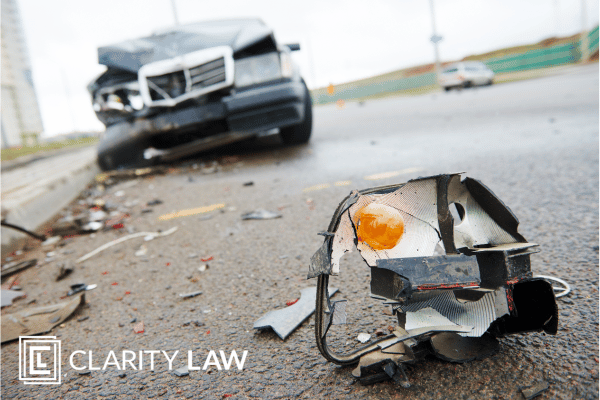
The charge of dangerous driving causing death or grievous bodily harm (“GBH”) is a serious offence in Queensland, carrying a maximum penalty of 14 years imprisonment. Tragically often the tiniest mistake by a driver can lead to a person suffering death or grievous bodily harm and the driver who often has never broken the law before forced to navigate the court system.
If you or someone you know has been charged with this offence, it is crucial to understand the legal implications and seek legal representation immediately.
The purpose of this article is to give some information to a person faced with a charge of dangerous driving causing death or grievous bodily harm.
What constitutes dangerous driving causing death or GBH?
Dangerous driving causing death occurs when a person operates a vehicle in a manner that creates a risk of serious harm or death to others, and this driving directly results in the death or GBH of another person. This can include actions such as:
-
Excessive speeding
-
Driving under the influence of alcohol or drugs
-
Fatigued driving
-
Distracted driving
-
Ignoring traffic signals and road rules
-
Street racing
"Grievous bodily harm" includes serious injuries or disfigurement resulting from an accident. It includes the loss of a distinct part or organ of the body or serious disfigurement or any bodily injury of such a nature that, if left untreated, would endanger or be likely to endanger life or cause or be likely to cause permanent injury to health
It is immaterial whether or not medical treatment is or could have been available to the injured person.
Aggravating factors
Certain factors can increase the seriousness of the charge and the potential penalty, including:
-
Being under the influence of alcohol or drugs at the time of the offence
-
Exceeding the speed limit by a significant margin
-
Engaging in reckless driving behaviour such as weaving in and out of traffic or ignoring road closures
-
Having a prior history of dangerous driving offences
The arrest process and the right to silence
Most often, individuals are arrested for dangerous driving after an accident or a complaint from another motorist. It is crucial to note that one has the right to remain silent and is not obliged to answer police questions.
The legal process
If you are charged with dangerous driving causing death, you will be required to appear in court.
Section 328A of the Criminal Code sets out the penalty.
The prosecutor must prove beyond a reasonable doubt that;
-
you were driving a motor vehicle, or you interfered with someone who was; and
-
your driving, or interference, was dangerous; and
-
as a result of your driving or interference, another person was killed or suffered grievous bodily harm.
The term "operates a motor vehicle dangerously" involves operating a vehicle at a speed or in a manner dangerous to the public, considering various factors such as the;
-
the nature, condition and use of the place; and
-
the vehicle's condition; and
-
The number of people or vehicles that might be expected in the place; and
-
the presence of alcohol or other substances in the driver's body, among others.
"Dangerously" is to be given its ordinary meaning of something that presents a real risk of injury or damage. The ordinary meaning of ‘dangerous’ when applied to driving, a manner or speed of driving which gives rise to a risk to others, including motorists, cyclists, pedestrians and the driver’s own passengers.
It is not necessary for the prosecution to prove that the dangerous operation of the motor vehicle was the sole cause of the deceased’s death or complainant’s grievous bodily harm. It is sufficient for it to show that the dangerous driving was a substantial or significant cause of that result.
Who prosecutes the charges?
The Office of the Director of Public Prosecutions will prosecute the matter but will rely on the Queensland Police Service to investigate the matter and obtain the evidence.
Penalties for dangerous driving causing death or GBH
The potential penalties for dangerous driving causing death can be severe, including:
-
Imprisonment
-
Disqualification from driving for a significant period
-
Large fines
-
Community service orders
Factors considered in determining penalties
Courts consider factors such as the maximum penalty, the nature and seriousness of harm, the offender's history, age, character, and rehabilitation efforts.
Defences
There are a few potential defences to the charge of dangerous driving causing death, such as:
-
the absence of dangerous driving
-
being wrongly identified as the driver
-
defects in the vehicle
-
sudden medical conditions
-
extraordinary emergencies.
It is important to understand that the expression "operates a vehicle dangerously" in general does not require any given state of mind on the part of the driver as an essential element of the offence. A motorist may believe he or she is driving carefully yet be guilty of operating a vehicle dangerously.
A lawyer would be required to properly advise as to what defences might be available. If you plead not guilty to the charge of dangerous operation of a motor vehicle driving causing death or grievous bodily harm because you have a defence then the matter will go to a trial before a jury.
Check out our dedicated page of Dangerous Driving Defences in Queensland.
Importance of legal representation
Navigating the legal system after being charged with dangerous driving causing death or GBH can be complex and overwhelming. It is crucial to seek legal representation from a qualified criminal lawyer who has experience with this type of offence.
A lawyer can:
-
Advise you of your rights and legal options
-
Obtain and review evidence
-
Prepare your defence or guilty plea
-
Represent you in court
-
Negotiate with the prosecution on your behalf
-
Ensure you receive the best possible outcome
Never speak to police about any allegation of driving dangerous until you have first spoken to a lawyer. You have the right to silence when it comes to criminal charges.
Possibility of prison sentence
It all depends on what happened, whether alcohol or drugs were involved and the extent of the injuries to the victim. In most cases you can expect a prison sentence if you plead guilty or are found guilty after a trial for a charge of dangerous driving causing death or grievous bodily harm.
Can the charge be withdrawn?
Depending on the circumstances it may be possible to negotiate the charge with the prosecutor. This is called case conferencing. For example it might be possible to try and convince the prosecutor that the offending was only careless and not dangerous and that the charge should be withdrawn or perhaps reduced to careless driving.
Read more about careless driving causing death or GBH.
What court hears the matter?
The charge will start in the Magistrates court closest to where the accident occurred but will eventually need to be transferred to the District court to be finalised.
How long will the charge take to resolve?
It all depends on whether you are pleading guilty or not guilty. Typically for a guilty plea in the Brisbane Court it might take 9-12 months from the arrest to when it is finalised in the Brisbane District Court.
How long will the licence disqualification be for?
The disqualification period must be at least 6 months but depending on the circumstance of the charge and the traffic history perhaps much longer. It is not possible to obtain a work licence or hardship licence to allow you to drive during the disqualification.
What type of accidents can result in a dangerous driving charge?
A charge for dangerous driving often results from split second errors in judgement. We have in the past acted for people who have been charged with dangerous driving for;
-
Failing to see a motorcycle before entering an intersection
-
Being temporarily distracted causing the car to run off the road into the other lane of traffic
-
Falling asleep at the wheel resulting in a collision with a power pole and serious injuries to the passenger in the car
-
Turning too sharply on a dirt road causing the vehicle to roll and cause injury to a passenger in the vehicle
-
Driving at excessive speed
In most cases if no person had been injured the driver may only have faced a careless driving charge.
Dangerous driving vs. dangerous operation of a motor vehicle
Both terms are synonymous and refer to the same offence.
Is this a traffic matter or criminal charge?
It is a criminal charge and if a conviction is recorded it will go on your criminal history.
Possibility of criminal conviction
A criminal conviction is very possible, and its impact on travel, employment, and insurance costs should be considered. Only an experienced traffic lawyer can advise on whether a conviction will likely be recorded or not.
Difference Between Careless Driving and Dangerous Driving
Dangerous driving is a more serious charge, considering factors like speed, the nature of the accident location, and the potential risk to others. The must be some act that is dangerous to other people.
Careless driving involves failure to exercise the degree of care and attention that a reasonable and prudent driver would have exercised.
Young offenders and charges
Special rules apply when sentencing a youth (under 18yrs old) charged with dangerous driving, with the Children's Court operating under the Youth Justice Act 1992.
Seeking legal help
If you have been charged with dangerous driving causing death in Queensland, it is important to seek legal advice as soon as possible. Contact a reputable criminal lawyer today to discuss your case and learn more about your legal options.
What should I do if charged or accused of dangerous driving causing death or GBH?
Contact us for immediate advice.
If I contacted you what would occur?
If you contact us then Steven Brough the firm’s founder or our office manager Belinda Smyth will take the call or receive the email. They have 45 years legal experience between them, we can provide immediate legal assistance and answer any questions you have. We will discuss your case, provide guidance and send a quote by email with additional relevant information about your charge, all at no cost.
If you want to engage us then it’s easy, there is a form you can complete and email back or complete online. If you don’t want to engage us or want to engage another firm that’s fine, you won’t be hassled and at worst you will just have more information about your charge. Once engaged one of our lawyers will go through your matter and contact you to discuss what the best way forward is to achieve the best results. Every one of our lawyers are very experienced with thousands of courts appearances between them.
How do I get more help or engage you to act for me?
We have been operating since 2010 throughout South East Queensland.
If you want to engage us or just need further information or advice then you can either;
-
Use our contact form and we will contact you by email or phone at a time that suits you
-
Call us on 1300 952 255 seven days a week, 7am to 7pm
-
Click here to select a time for us to have a free 15 minute telephone conference with you
-
Email This email address is being protected from spambots. You need JavaScript enabled to view it.
-
Send us a message on Facebook Messenger
-
Click the help button at the bottom right and leave us a message
We are a no pressure law firm, we are happy to provide free initial information to assist you. If you want to engage us then great, we will give you a fixed price for our services so you will know with certainty what we will cost. All the money goes into a trust account monitored by the Queensland Law Society and cannot be taken out without your permission or until we are legally allowed to.
If you don’t engage us that fine too, at least you will have more information on the charge and its consequences.
Need more information?
We have a range of articles on dangerous driving on our blog. Some of the most recent have included:





